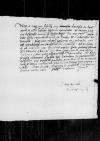List #103
Remaclus [ARDUENNA] do Ioannes DANTISCUSMechelen, [1523]-06-11
Rękopiśmienne podstawy źródłowe:
| ||||||
Tekst + aparat krytyczny + komentarz Zwykły tekst Tekst + komentarz Tekst + aparat krytyczny Ekscerpty dotyczące podróży Dantyszka
Magnifico generosoque viro, domino
Neque te, neque me fefelli, mi Dantisce Dantisce, si locum apud te ullum habeat legitima excusatio, et tamen scio me disperisse animumque despondisse, ita me totum hosce dies stilis conscribillarunt et
Vale.
Tuus probably
Tuus ex animo


 BCz, 1599, p. 1174
BCz, 1599, p. 1174